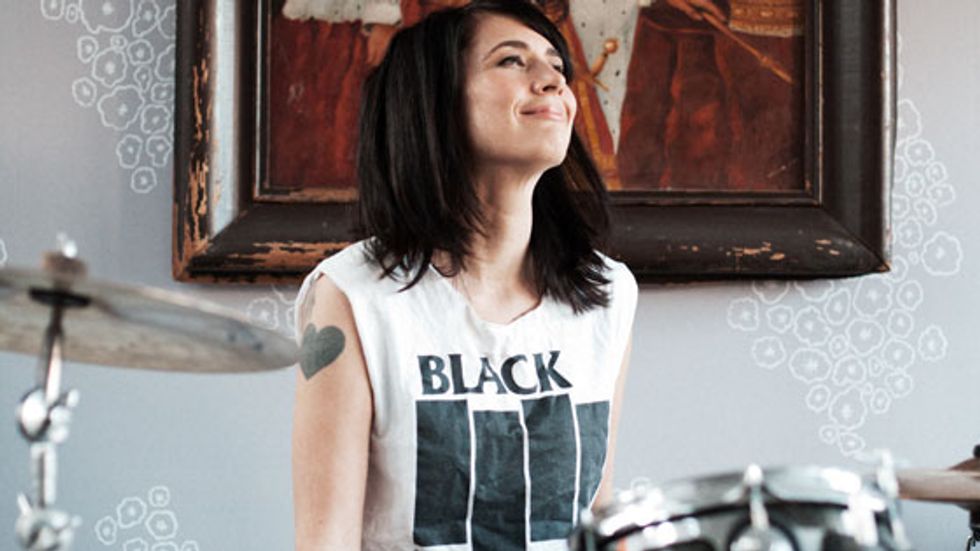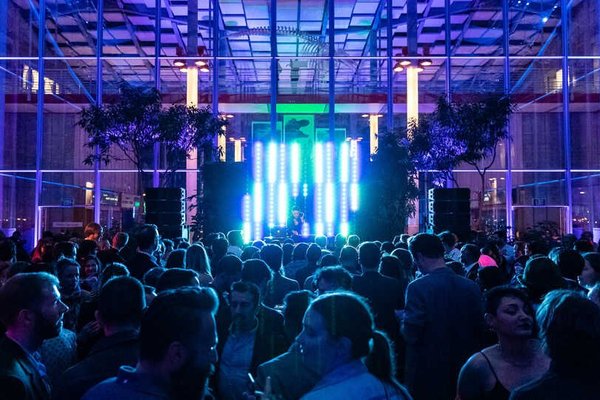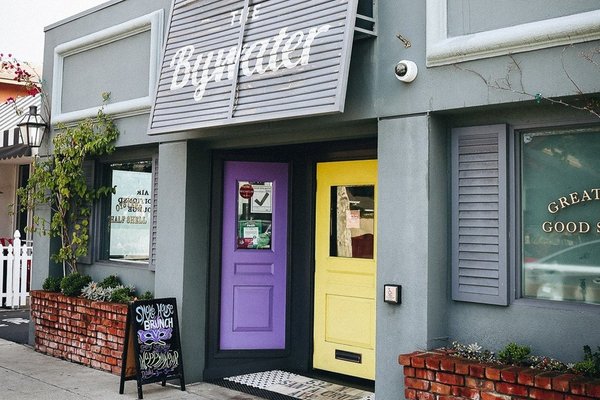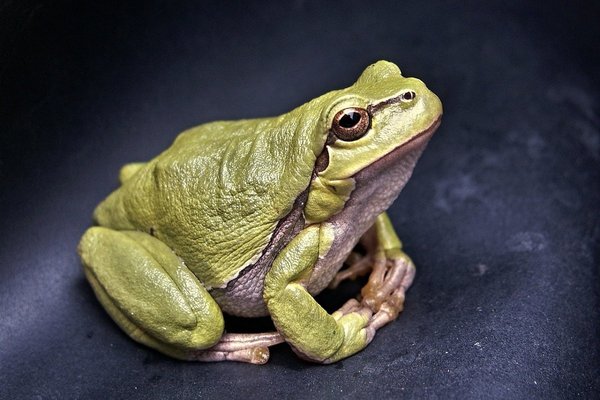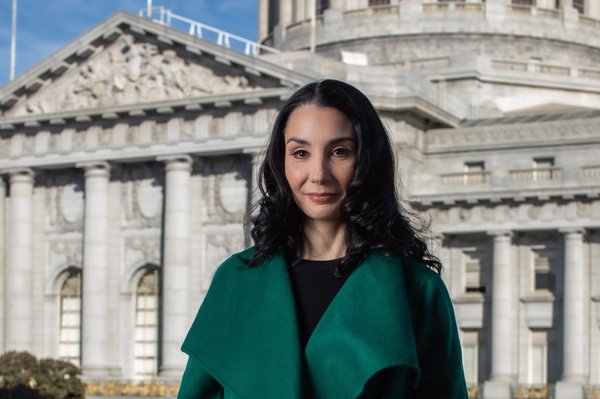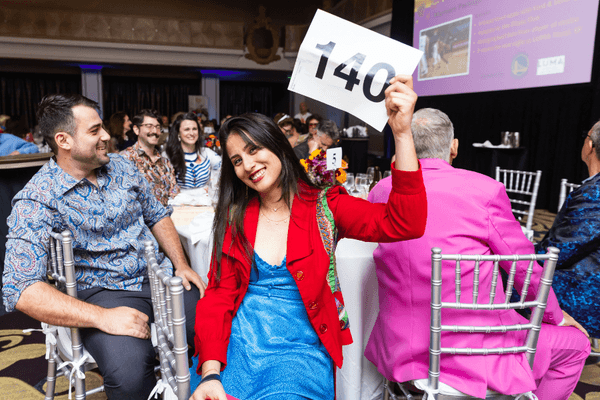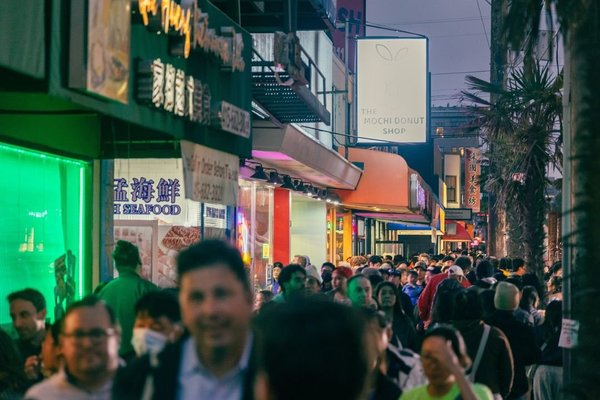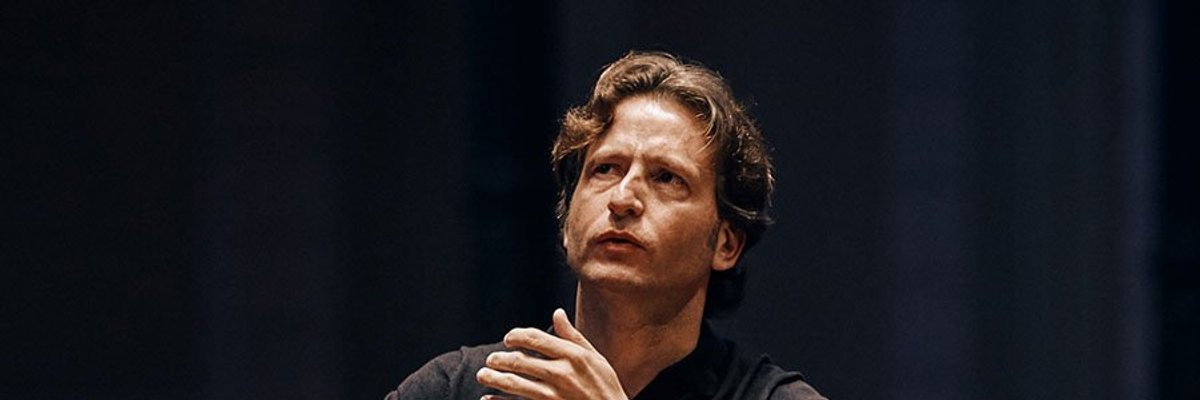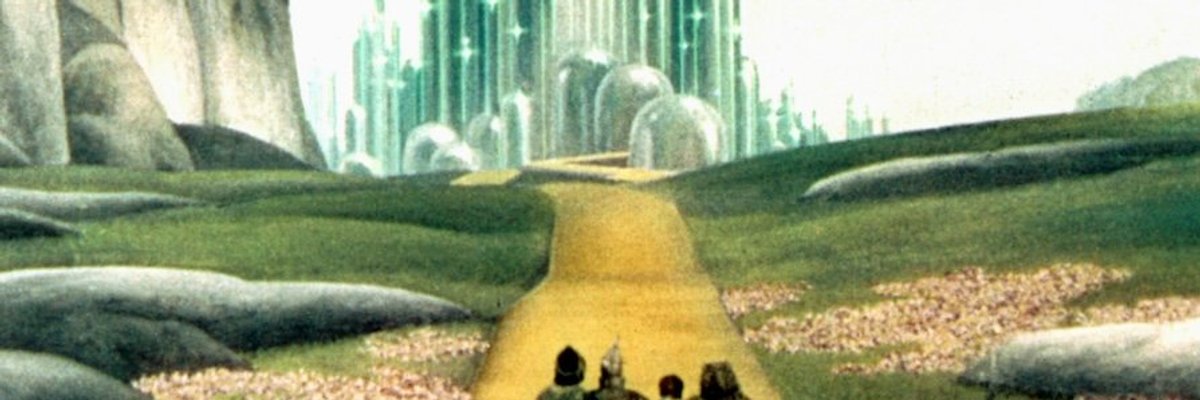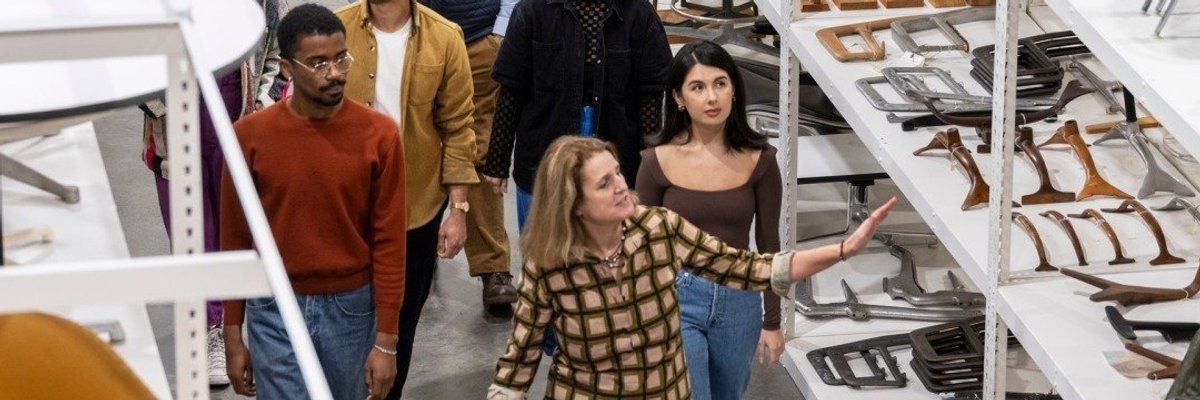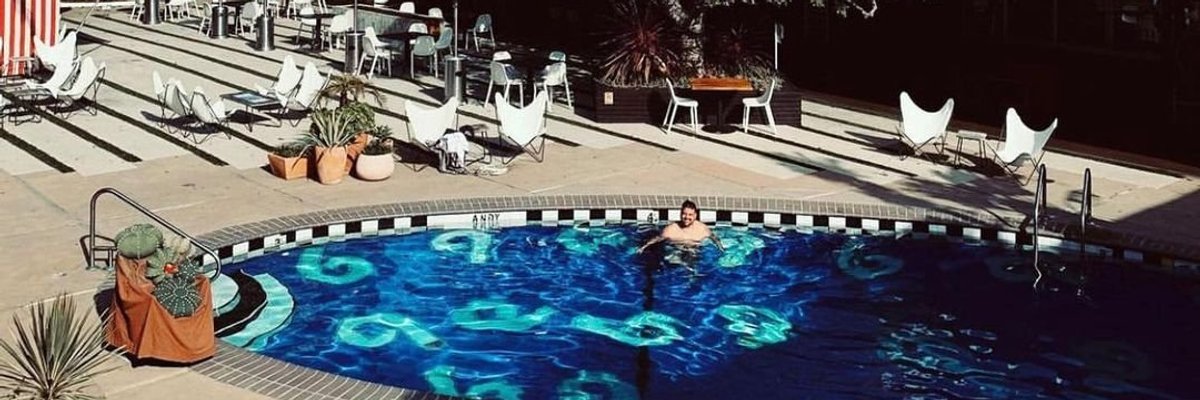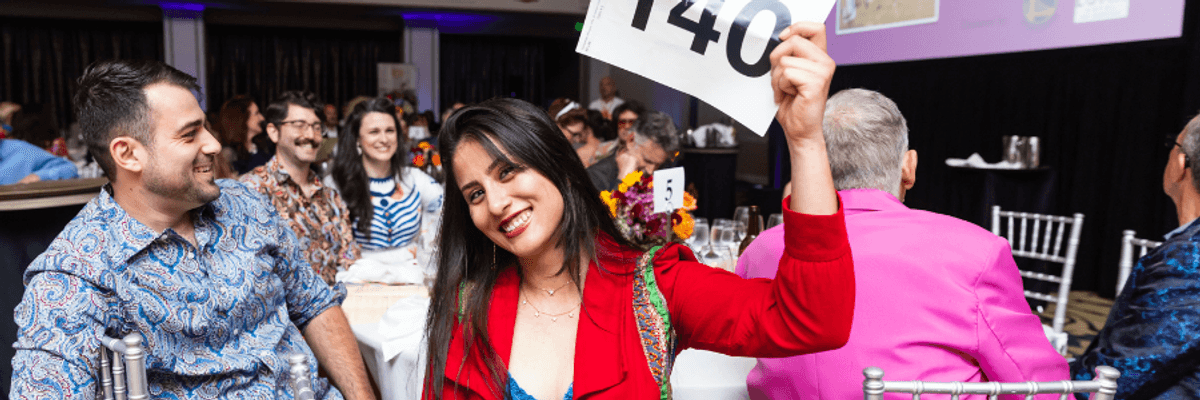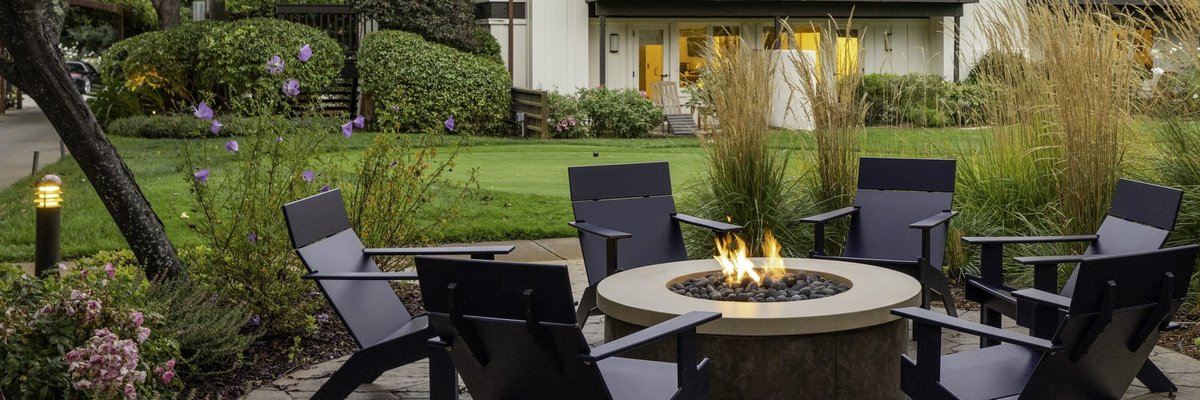It pains me to say it, but there isn't much going on in movies over Thanksgiving. Big studios know they have a captive audience, so they dump some of their least interesting flicks over the long holiday. Do yourself a favor (unless you've got kids, then definitely go see Disney's Frozen) and plop down on the couch in front of some Netflix and consider something to be really thankful for: the continuing existence of Kathleen Hanna.
The front woman of Bikini Kill (and Le Tigre, and Julie Ruin, and The Julie Ruin) is the subject of The Punk Singer, a new documentary coming to SF next week about her and the feminist punk movement she sparked back in the 90s. Her influence still permeates the furthest reaches of music today, from the house-happy tunes of Hercules and Love Affair to online thinkpieces about "Grimes, an internet-happy riot grrrl with colour-changing hair." As with anything worthwhile, Kathleen's mission hasn't been an easy one--she's been fighting for her life since she announced her heartbreaking "retirement" in 2005. A few weeks ago, I spoke to the alt-icon herself and the film's director, Sini Anderson, about The Punk Singer, Kathleen's illness, and where the riot grrrl is going next.
So how did The Punk Singer come about?
KH: Sini came to me after I'd come to her to ask her to help me edit this Le Tigre concert documentary. We were working on it and I think that sort of set her mind spinning, and she was like "what if we made a movie about your life?"
I'm one of the only people who can get all of this archival footage, and we were digitizing it at the time at NYU, and they were a huge help--I hate the word blessing, but they were a blessing! They digitized all my VHS tapes. I couldn't have done it myself. I was already in the process of giving it to them and they have state of the art facilities. What more could you ask for? Then they were passing Sini the DVDs and the hard drives.
Then came the part of seeking people out. There were all these photos and archival footage that a lot of people had handed me on tour. So a lot of my job was the detective work that I did, like seeing a picture and saying "Oh, that's the Macondo," then finding out who was shooting at the Macondo at the time.
SA: I kept throwing a net out… I was like "I need women!" "I need you guys to help me!" "Where are you at?" And they did! They were fantastic.
That's almost a movie in itself.
KH: It was a pain in the ass, actually! I didn't think it would be something I had to do, in terms of the film. I just think sometimes it's easier to do it yourself instead of saying "I can't do it!" because you get people calling you, sending you emails, whatever.
For the uninitiated, what's the difference between Bikini Kill, Le Tigre and Julie Ruin?
SA: Bikini Kill was this completely rowdy punk rock band that started in the early 90s in Olympia, Washington. Kind of in response to the all-boy punk rock scene that was floating around. The riot grrrl stuff started out of that. Julie Ruin was Kathleen's solo project out of Bikini Kill, but she did this awesome thing of carrying her aesthetic and her style over, so you can see that in JR. You could see it in Bikini Kill, but you could see it was really hers in Julie Ruin. It was a solo project, but with a very specific style. Then bringing that into Le Tigre, it just feels like she opened up more and more through each project, and became more willing to tell her journey--to be open and to help people feel less alone. By the time she got there you could tell that this was a band that wanted to see women succeed--that wanted to see queers succeed.
What does it mean to be a riot grrrl? Kathleen is right at the beginning of that arc.
SA: I think that what it meant, and hopefully still does, is to either be a teenager, or a young woman or an older woman deciding that she wants to take on that identity--to start speaking up. To claim that identity. Anyone could start a riot grrl chapter and I think it was really empowering for a lot of women who felt trapped in smaller cities.
Was that something that empowered you as a young woman?
SA: No, actually! I wasn't part of the riot grrl scene, I was part of the queer core scene, which was neck and neck with riot grrrl. I was living in San Francisco at the time, and I was doing something called Sister Spit. We were totally friends and allies, but totally a different scene. Riot grrrl didn't seem to me… it wasn't exactly what I needed, but I think it was what a lot of people needed.
Do you feel like it's a piece of history now?
SA: I don't think it's something that exists as much, but I was just in Long Beach, CA, for a screening, and these girls came up to me that were like 17, and they were like: "We're the riot grrrl Long Beach chapter!" And I was like "What!?" They were so excited about it, it was really rad. I don't think it either needs to be on or over, people just need to stake a claim on it.
KH: I don't think that there has to be something called "riot grrrl" in the future, but I definitely see a way that young feminists, or young queer feminists, or older, can take what we did in the punk scene and expand upon it. Like--Where's the transgender person? Where's the woman from the working class background? Maybe they're right there next to you. I want to hear their voices. I feel like, while there were woman of color who very much shaped RG, and there were LGBT people who did as well, I feel like they were definitely pushed to the background by white middle class voices.
Sini, just so we know, what's your favorite Bikini Kill song?
SA: Feels Blind. It's an amazing song. In the film Corin Tucker is talking about it, and crying. It's a really powerful song.
Sleater-Kinney really owes Kathleen a bit, at least in terms of delivery.
SA: Yeah, Corin was an art student in Olympia at the time Bikini Kill started playing a lot. She used to go to all the shows, and film them and interview them. The interview of Bikini Kill on the couch in the film--it was really rare to get them all together--it's actually Corin Tucker's senior project film. So that was her interviewing them, before she was in a band.
You stayed away from scandal in this one, a lot of punk docs are about scandal, but you avoided that--Courtney Love punched Kathleen once, so it's certainly there. Why skip it?
SA: It's boring to me. There's just so much story, that I had trouble getting even to the most important parts, without it. I just didn't have any room, or need, to give in to fear and get the scandal. I think that would have been so weak of me [laughs]. That would have been really lame!
Kathleen, are you working on anything now?
KH: I'm working on gearing up for more touring, doing press for the film, Q&As. I'm in the process of finishing a comedy show called Bridget Drives the Bus.
Where will we get to see it?
KH: Well, I'm not at liberty to say yet because we haven't signed the contract, but it's very exciting. It's the first comedy series, obviously, that I've ever written. And it's not like Portlandia! People have been asking "Did you write it because of Carrie [Brownstein of Sleater-Kinney]?" and I actually wrote it because of Bridget [Everett], who's this friend of mine who's incredible talented, and I thought it was a great vehicle for her talent. When I was sick at home, I had nothing to do, and I felt like I had the mental capacity to do it, to make me laugh.
Now that you bring it up, how are you doing?
KH: I'm doing pretty good, I have good days and bad days. I do have an IV in my arm. I'm laying in my bed in my pajamas right now! Not trying to be gross, but I'm just saying I'm in treatment right now still.
SA: That happened during filming actually--when she was diagnosed. I think what people don't know is that she didn't know what was wrong with her that she was actually telling herself she didn't have anything else to say. It's heartbreaking to hear that from someone like Kathleen. There's a moment in the film, and interview, in which she figures out during it that she was actually not done, she was sick.
I think you sound pretty good.
KH: That's hilarious. When I was in high school when I drank a lot, I could like, sneak in the house, or be on massive amounts of acid, and still sit down and watch a movie with my mom and act like I was still normal. So, [laughs] I feel like I learned these tricks at a young age. But don't do drugs kids! Stay in school.
The Punk Singer opens December 6th at the Roxie.



